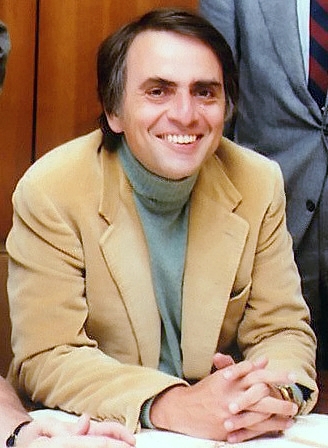Carl Sagan Berühmte Zitate
„Im Bewusstsein des Menschen erkennt die Natur sich selbst“
Quelle: http://www.carlsagan.com Übersetzer: Guido Biermann)
Original engl.: "We are a way for the Cosmos to know itself."
Carl Sagan Zitate und Sprüche
Der Drache in meiner Garage oder Die Kunst der Wissenschaft, Unsinn zu entlarven. Köln, 2000. ISBN 3-426-26912-0. Übersetzer: Michael Schmidt
"There are naive questions, tedious questions, ill-phrased questions, questions put after inadequate self-criticism. But every question is a cry to understand the world. There is no such thing as a dumb question" - The Demon-Haunted World - Science as a Candle in the Dark. Ballantine Books 1996. p. 323
Unser Kosmos (Fernsehserie), Folge 12: "Eine galaktische Enzyklopädie"
Original engl.: "What counts is not what sounds plausible, not what we would like to believe, not what one or two witnesses claim, but only what is supported by hard evidence rigorously and skeptically examined. Extraordinary claims require extraordinary evidence."
Unser Kosmos, München 1991, ISBN 3-426-04053-0, Kapitel 9, Seite 230. Übersetzer: Siglinde Summerer, Gerda Kurz
Original engl.: "If you wish to make an apple pie from scratch, you must first invent the universe."
Carl Sagan: Zitate auf Englisch
“Humans are very good at dreaming, although you’d never know it from your television.”
Quelle: Contact (1985), Chapter 20 (p. 359)
As quoted in "Scientists & Their Gods" in U.S. News & World Report Vol. 111 (1991)
The Varieties of Scientific Experience: A Personal View of the Search for God (2006)
Talk of the Nation (3 May 1996)
56 min 20 sec
Cosmos: A Personal Voyage (1990 Update), The Shores of the Cosmic Ocean [Episode 1]
The Varieties of Scientific Experience: A Personal View of the Search for God (2006)
36 min 20 sec
Cosmos: A Personal Voyage (1990 Update), Who Speaks for Earth? [Episode 13]
6 min 10 sec
Cosmos: A Personal Voyage (1990 Update), Who Speaks for Earth? [Episode 13]
Kontext: Unlike the La Pérouse expedition the Conquistadors sought not knowledge but Gold. They used their superior weapons to loot and murder, in their madness they obliterated a civilisation. In the name of piety, in a mockery of their religion, the Spaniards utterly destroyed a society with an Art, Astronomy and Architecture the equal of anything in Europe. We revile the Conquistadors for their cruelty and shortsightedness, for choosing death. We admire La Pérouse and the Tlingit for their courage and wisdom, for choosing life. The choice is with us still, but the civilisation now in jeopardy is all humanity. As the ancient myth makers knew we're children equally of the earth and the sky. In our tenure on this planet we've accumulated dangerous evolutionary baggage, propensities for aggression and ritual, submission to leaders, hostility to outsiders, all of which puts our survival in some doubt. But we've also acquired compassion for others, love for our children, a desire to learn from history and experience and a great soaring passionate intelligence, the clear tools for our continued survival and prosperity. Which aspects of our nature will prevail is uncertain, particularly when our visions and prospects are bound to one small part of the small planet Earth. But up there in the Cosmos an inescapable perspective awaits. National boundaries are not evident when we view the Earth from space. Fanatical ethnic or religious or national identifications are a little difficult to support when we see our Earth as a fragile blue crescent fading to become an inconspicuous point of light against the bastion and the citadel of the stars. There are not yet obvious signs of extraterrestrial intelligence and this makes us wonder whether civilisations like ours rush inevitably headlong into self-destruction.
Charlie Rose: An Interview with Carl Sagan http://www.charlierose.com/guest/view/4553, May 27, 1996.
Cited in Tim Flannery, Atmosphere of Hope. Solutions to the Climate Crisis, Penguin Books, 2015, pages 162 ISBN 9780141981048.
Others
Quelle: Pale Blue Dot: A Vision of the Human Future in Space (1994), p. 227
“I think people in power have a vested interest to oppose critical thinking.”
http://www.sciencefriday.com/segments/carl-sagan-science-is-a-way-of-thinking/
Carl Sagan: 'Science Is a Way of Thinking', Science Friday interview from May 1996
27 December 2013
The Varieties of Scientific Experience: A Personal View of the Search for God (2006)
Keynote address at CSICOP conference (1987), as quoted in Do Science and the Bible Conflict? (2003) by Judson Poling, p. 30
Planetary Exploration (University of Oregon Books, Eugene, Oregon, 1970), page 15
Quelle: The Demon-Haunted World : Science as a Candle in the Dark (1995), Ch. 25 : Real Patriots Ask Questions
“Other things being equal, it is better to be smart than to be stupid.”
Quelle: Cosmos (1980), p. 284
“Jingoistic rhetoric and puerile self-congratulatory nationalism.”
Quelle: Contact (1985), Chapter 11 (p. 181)
“Human beings have a demonstrated talent for self-deception when their emotions are stirred.”
Quelle: Cosmos (1980), p. 135
The Varieties of Scientific Experience: A Personal View of the Search for God (2006)
http://www.sciencefriday.com/segments/carl-sagan-science-is-a-way-of-thinking/
Carl Sagan: 'Science Is a Way of Thinking', Science Friday interview from May 1996
27 December 2013
Quelle: Billions and Billions: Thoughts on Life and Death at the Brink of the Millenium (1997), Chapter 14, "The Common Enemy".
